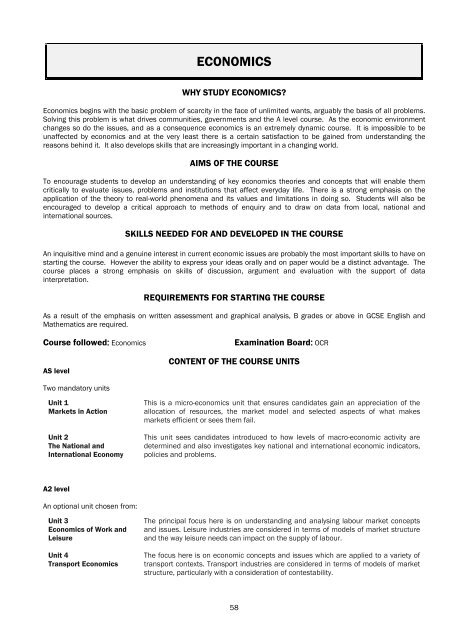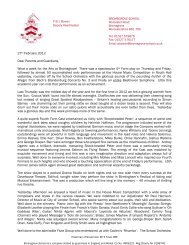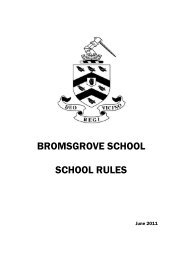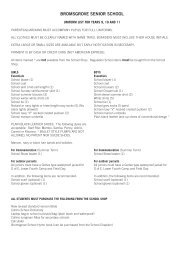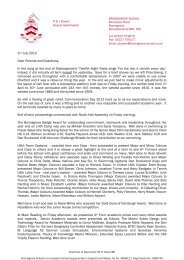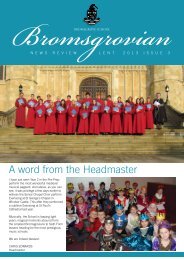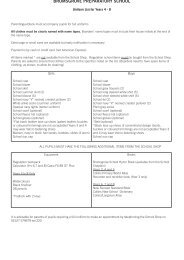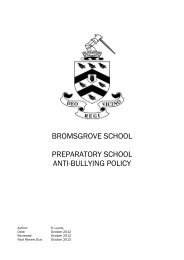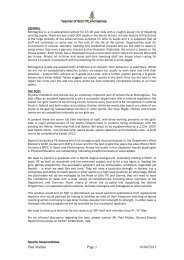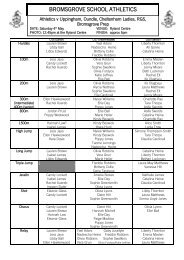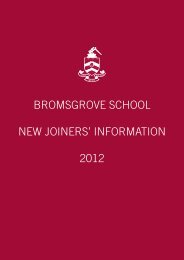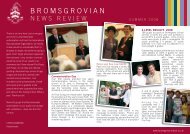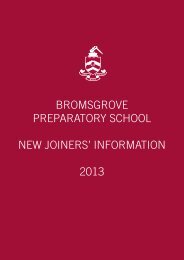Sixth Form Course Booklet 2013 - Bromsgrove School
Sixth Form Course Booklet 2013 - Bromsgrove School
Sixth Form Course Booklet 2013 - Bromsgrove School
You also want an ePaper? Increase the reach of your titles
YUMPU automatically turns print PDFs into web optimized ePapers that Google loves.
ECONOMICS<br />
WHY STUDY ECONOMICS?<br />
Economics begins with the basic problem of scarcity in the face of unlimited wants, arguably the basis of all problems.<br />
Solving this problem is what drives communities, governments and the A level course. As the economic environment<br />
changes so do the issues, and as a consequence economics is an extremely dynamic course. It is impossible to be<br />
unaffected by economics and at the very least there is a certain satisfaction to be gained from understanding the<br />
reasons behind it. It also develops skills that are increasingly important in a changing world.<br />
AIMS OF THE COURSE<br />
To encourage students to develop an understanding of key economics theories and concepts that will enable them<br />
critically to evaluate issues, problems and institutions that affect everyday life. There is a strong emphasis on the<br />
application of the theory to real-world phenomena and its values and limitations in doing so. Students will also be<br />
encouraged to develop a critical approach to methods of enquiry and to draw on data from local, national and<br />
international sources.<br />
SKILLS NEEDED FOR AND DEVELOPED IN THE COURSE<br />
An inquisitive mind and a genuine interest in current economic issues are probably the most important skills to have on<br />
starting the course. However the ability to express your ideas orally and on paper would be a distinct advantage. The<br />
course places a strong emphasis on skills of discussion, argument and evaluation with the support of data<br />
interpretation.<br />
REQUIREMENTS FOR STARTING THE COURSE<br />
As a result of the emphasis on written assessment and graphical analysis, B grades or above in GCSE English and<br />
Mathematics are required.<br />
<strong>Course</strong> followed: Economics<br />
AS level<br />
Examination Board: OCR<br />
CONTENT OF THE COURSE UNITS<br />
Two mandatory units<br />
Unit 1<br />
Markets in Action<br />
Unit 2<br />
The National and<br />
International Economy<br />
This is a micro-economics unit that ensures candidates gain an appreciation of the<br />
allocation of resources, the market model and selected aspects of what makes<br />
markets efficient or sees them fail.<br />
This unit sees candidates introduced to how levels of macro-economic activity are<br />
determined and also investigates key national and international economic indicators,<br />
policies and problems.<br />
A2 level<br />
An optional unit chosen from:<br />
Unit 3<br />
Economics of Work and<br />
Leisure<br />
Unit 4<br />
Transport Economics<br />
The principal focus here is on understanding and analysing labour market concepts<br />
and issues. Leisure industries are considered in terms of models of market structure<br />
and the way leisure needs can impact on the supply of labour.<br />
The focus here is on economic concepts and issues which are applied to a variety of<br />
transport contexts. Transport industries are considered in terms of models of market<br />
structure, particularly with a consideration of contestability.<br />
58


